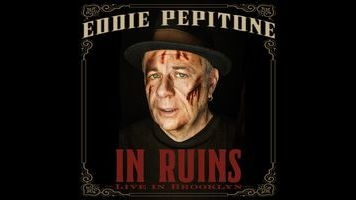Eddie Pepitone’s latest comedy album is a delightfully cutting sermon

Eddie Pepitone has a gift for predicting disaster. Much of his comedy album In Ruins (taking its name and much of its material from last year’s Netflix special) finds him using everything from sports to corporate advertising to its natural conclusion—ways to forget about death and the inevitable collapse of the world for another few seconds. Not that “The Bitter Buddha” is immune to this fatalism—during one particularly notable bit, “Reporting Live,” he pretends to be reporting from a catastrophe, bellowing with equal parts rage and fear. The scene sounds apocalyptic, like a dispatch from the end of civilization, before Pepitone reveals that he’s just describing what he sees in his own apartment. He’s dropped Cheerios under his refrigerator.
That’s right on target for Pepitone, a comedian and actor who has only come into his own in his 50s. His decades-long struggle for recognition, deep-seated anger, and cultish following within the comedy community is captured in the 2012 documentary The Bitter Buddha, which presaged something of a career renaissance for the comic’s comic, who has since appeared on a number of TV shows (including a perfectly cast recurring role as a tortured soul on Adult Swim’s Your Pretty Face Is Going To Hell).
That rage finds a more than suitable outlet in the faux-superficiality of In Ruins, in bits ranging from commercials accurately depicting uses of products for those suffering from crippling despair to a version of The Price Is Right for the hidden costs of the Iraq War.
The album features Pepitone playing to a crowd of adoring fans in his hometown of Brooklyn. He still might not quite have hit the big time, but he’s enough of an alt-comedy stalwart at this point that he doesn’t have to worry about anyone in the packed house missing his jokes about the structure of “vapid round of applause bullshit,” a setup that enables every call for a round of applause to be a punchline in itself. Many of the lines that get the most laughs are also the ones that sound like philosophy masquerading as comedy, which make the album’s material more intellectual, borderline spiritual than usual, even from Pepitone. By the time Pepitone is singing about watching murder on TV on “Blue Collar Lounge Singing,” In Ruins has turned into a world-weary victory lap.
Pepitone makes a great, consistent background player precisely because he is, in a sense, a complete caricature, something he acknowledges in consistent references to his Brooklyn roots (while also castigating the members of the audience who are changing his hometown). Where some comedians try to make a personal connection, it’s hard to pin down Pepitone the man, precisely, because all of his seemingly personal jokes turn surreal. Do his car rides with his wife really consist in listing off facts about box turtles? Does he really enjoy cinnamon swirl raisin peanut butter? Probably not, but the jokes (along with Pepitone’s well-placed, deeply depressing singing) all express something a little deeper.
Admittedly, that can be a bit exhausting. Pepitone delights in discomfort, and his worldview is so consistent in its acridity that the despair can wear a bit, even over the course of an hour. But his sadness never threatens to fully derail the enterprise. Although Pepitone’s comedy comes from an unflinchingly bleak perspective on humanity (“cunning, deceitful fucks”), it’s difficult not to be swept up by his not-so-secret enthusiasm, and harder still not to be convinced that—against all odds—a guy who is known, in part, for heckling himself, is happy. In fact, he sometimes seems like a big kid, gleeful that he gets to do this for a living. “I didn’t think I was very good,” he sheepishly admits as the album winds down. He doesn’t have to be so self-deprecating.